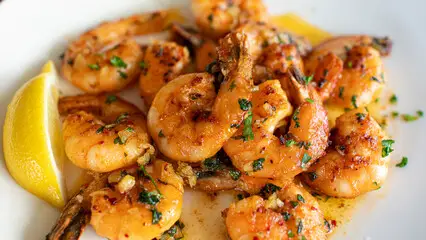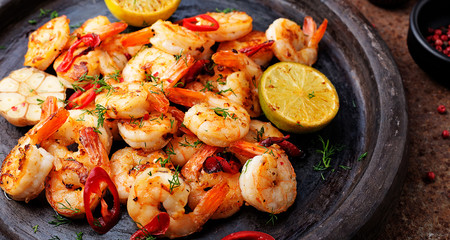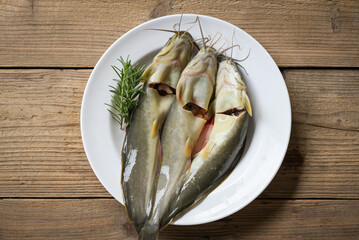
Suppose you are a Muslim and you are wondering about the halal status of Scampi. In that case, this article will answer your question. It will also explain what shrimp is, why it’s haram or Halal, and how to make sure that your shrimp is always Halal.
Is Prawns Scampi Halal Or Haram?
Depending on your school of thought, Scampi may be halal. The main ingredient for Scampi is shrimp, and many people do not eat shrimp due to religious beliefs. In some Muslim countries, shrimps are considered Haram, but in other Muslim countries, shrimps are considered halal.

For example, in Indonesia, shrimp are considered halal. However, the side dish that comes with the meal is what makes it haram or halal. If a non-Halal sauce is used on the shrimp, it is Haram since the sauce contains pork fat or some other non-Halal ingredient.
Scampi is an Italian word and is used to denote the peeled tail of any prawn. For instance, Americans use the word “scampi” to refer to a shrimp dish made with garlic butter. And since shrimps are permissible, according to the sounder position in the Hanafi School, this dish is allowed.
However, in the more significant parts of Europe, “scampi” denotes a type of lobster dish. And given the impermissibility of lobsters in the Hanafi School, this type of “scampi” would be impermissible.
Is Shrimp Halal or Haram?
Like most seafood, shrimp is not always halal. It depends on the ingredients used to make the meal, where you live, and whether or not you have a recipe that will ensure it’s halal. For example, suppose you live in Dubai and order shrimp from your local restaurant. In that case, there’s a good chance it will be halal because Dubai has a high Muslim population.
Alternatively, if you have shrimp tacos, then the ingredients used to make this meal may be Halal or Haram, depending on where you live. There are so many things that go into making shrimp tacos that it’s hard to say whether or not a particular taco is actually halal because there is more than one standard recipe for making these tacos across all countries in which they are popularly consumed.
What Is The Stance Of The Islamic School Of Thought On Scampi?
There has yet to be a consensus on this issue. Some scholars say it is halal; others say it is Haram. The Hanafi school of thought considers non-fish creatures to be impermissible. This would include squid, octopus, mussels, and other similar sea creatures.
According to their argument, shrimps are an arthropod (to which insects also belong), and it does not fall under the fish category. Hence they’ve been labeled under the category ‘makruh tahrim’ (strictly abominable) and advised Muslims against eating it.
However, many scholars consider prawns and shrimp permissible because they have vertebrae and are considered “fish.”
When Does Scampi Become Haram?
The following are some reasons why Scampi is Haram:
If it contains pork fat
While Scampi might be halal, the presence of port fat in your recipe renders it Haram. Pork fat can be found in some sauces, and it can be challenging to identify it. Therefore, if a food product doesn’t list pork fat as an ingredient, then don’t assume it’s halal or haram.
Also, consider where the seafood was sourced from. If there is any confusion about whether or not this animal was slaughtered according to Islamic law, then avoid it altogether until you get clarification from an authority figure.
If it’s made with some other haram ingredients
If the shrimp in your Scampi is processed with haram ingredients, such as gelatin and alcohol-derived products, then it would be considered Haram. Also, if the shrimp are cooked in a dish that also contains lard or pepsin (animal byproducts), it is still Haram to eat. This is because these substances have been labeled unclean and not fit to be eaten.
If it holds potential danger to your body
Any meal that holds the potential to damage your body is conserved Haram. For instance, shrimp can trigger an allergic reaction in some individuals. This essentially makes eating Scampi for them a haram.
If the shrimp had been fed with impure animal byproducts,
If the shrimp had been fed with impure animal byproducts, you should not eat it. Again, this is hard to tell since you will need to find out where your shrimp is coming from. And since a large percentage of the world’s seafood comes from fish farming, this increases the chances of your favorite Scampi becoming haram.
Can Muslims Eat Fish?
Yes, Muslims can eat fish. Muslims are permitted to eat fish as long as they know it is Halal (lawful). They must also pray before eating it and ensure it is caught legally. Some fish are Haram (unlawful), but some are Halal (lawful). The ones that are Halal have to be prepared in a halal manner; you cannot use haram things such as pork while cooking them.
If you are unsure of how the meat was slaughtered, then you should only consume it once you find out more information on its source before making your decision on whether or not to consume it further.
What are Halal Certified Products?
‘Halal-certified’ refers to products endorsed as Halal by a credible Islamic body. Halal certification often involves a series of steps, including ingredient verification, inspection, audit, and approval by the committee. All Halal-certified products are Halal, but not all Halal products are Halal-certified.
Are Prawns Considered Haram?
Prawns are a type of shellfish, but they are not considered Haram (forbidden). As a result, Muslims may eat prawns.
Prawns come from the saltwater crustacean family. There are different types of prawns that you can buy in supermarkets or buy fresh from the sea. The most common prawn used in cooking is called “king prawn,” which has a dark orange color and black stripes on its back. King prawns have a sweet taste and can be eaten raw or cooked by frying them in oil until they turn brown on both sides.
Conclusion
Muslims can eat shrimp as long as it’s Halal. Muslims should ask their local Imam or religious scholar before consuming any food item so they know whether it is permissible.

Hi, I’m Iolanda I am a mother of two and know how to whip up satisfying dishes for friends and family in a seemingly effortless way. The blog goal is reader-oriented, So We are always looking for the newest information about the best products on the market to offer product reviews and tutorials to assist users.Have Fun on The Website






